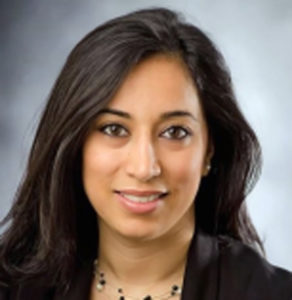 Amanda Chawla
Amanda Chawla
Vice President of Supply Chain
Stanford Health Care
Palo Alto, California
Born in Punjab, India, and raised in Seattle, Washington, Amanda Chawla watched her parents work tirelessly to raise their family in the United States. It wasn’t easy. Her father, PJ, did factory work, while her mother, Dee, worked as a cook. “Growing up with parents with strong work ethics and educational aspirations they couldn’t achieve, I recognized the self-drive to succeed,” she says. “I knew early on I wanted to help people.”
At age 17, she completed a medical assistant certification program and started to work immediately after as a unit clerk supporting clinical care. She concurrently completed her graduate studies obtaining a fellowship in healthcare administration, and moved into a variety of support and leadership roles. She worked in several management roles, from business management, health inspector, clinic administrator to vice president of operations over several years, and ultimately decided to specialize in healthcare supply chain. “Supply chain is a function that is a core part of any organization, touching every aspect downstream and upstream,” she says. Tackling complex processes, developing wide-ranging relationships and becoming a strategic partner for the healthcare organization are things she enjoys most about supply chain.
Describe a key mentor or event in your life.
Chawla’s desire to serve others matured as she grew into senior operational leadership roles. It was a chief human resources officer, Theresa Gianfortune, who served as an informal mentor. Chawla describes her as a strong, compassionate, articulate leader, who was evangelical in her approach. “We would work together on some of the most challenging transformations, people relations and culture dynamics. Theresa’s commitment, consistent leadership approach, and integrity held strong in every situation.
“The most notable thing she taught me was that we are in the people business; it is about the people we serve,” says Chawla. “Our greatest job and duty is to take care of our leaders and the people who take care of our patients. She is a role model and strong proponent of the advancement of women leadership.”
In what way(s) are you a better supply chain leader than you were, say, five or 10 years ago?
Chawla views supply chain as a key partner that touches every aspect of the organization. “I have learned that leading with authenticity, and building trust and alignment with all constituents who are touched by the services we provide are core ingredients of leadership. As healthcare has evolved, it is ‘non-negotiable’ that we become clinically integrated, [and that we] bring together all aspects of people, process and technology to provide a core service and serve as a strategic partner in value-based care.”
Describe the key characteristics of the successful supply chain leader of the future.
- Possesses strong change-management, communication and collaboration skills.
- Understands that relationships are vital, and a non-negotiable; supply chain is complex.
- Serves, provides mentorship and coaching – elevating the next level.
- Possesses transformational characteristics to understand the core aspects of supply chain, the needs of the organization, and the future of healthcare driving the next evolution of supply chain.
